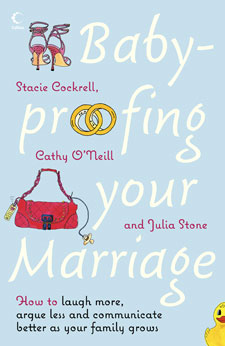As a father of 3 kids, and with a 4th on the way, I thought that it would be a good idea for me to have a look at Baby-proofing your marriage (BPYM).
BPYM is written by three married women who have seven children between them, the oldest of whom had just started school at the time of writing. It is very much a "how to' book (as the sub-title suggests) and it offers much practical advice about how to deal with issues like the post-baby sexual disparity, the division of labour, family pressures (e.g. in-laws), "me" time, and the quality of our time with our spouses.
 Whilst some of the practical advice is very helpful (the advice concerning "attitude' hit the mark with me), other parts left me feeling uncertain and sceptical. One reason for this is because some of the advice follows the maxim "I will do unto you so that I might receive from you"; a maxim which goes against the teaching of the Bible and the example of Christ. Another reason is that the authors' diagnosis of what causes problems for the marriages of parents of young children is faulty.
Whilst some of the practical advice is very helpful (the advice concerning "attitude' hit the mark with me), other parts left me feeling uncertain and sceptical. One reason for this is because some of the advice follows the maxim "I will do unto you so that I might receive from you"; a maxim which goes against the teaching of the Bible and the example of Christ. Another reason is that the authors' diagnosis of what causes problems for the marriages of parents of young children is faulty.
The authors describe themselves as "aspiring evolutionary biologists" (p3) and their diagnosis about the problems that come with parenthood rest upon evolutionary biology. For example, they say that:
"Our genetically-programmed instincts are at the root of many of our modern-day frustrations. They affect our post-baby sex lives, how we parent, and our relationships with our families, often in ways we're not conscious of." (p3)
I know from experience that, apart from tiredness, sinfulness is very much at the heart of the difficulties that come with parenthood. Parenthood has shown me just how selfish and lazy I can be and I don't think that this is due to genetic programming. But nowhere in BPYM is sin mentioned. Indeed the following quote is quite telling:
"As you may have guessed by now, whenever we can, we blame less-than-perfect behaviour (ours or anyone else's) on biological hardwiring." (p153)
The faults of the diagnosis and advice given in BPYM lie in the fact that it is not a Christian book, even though one of the authors appears to go to church (p90). The only real mention that God gets is with regards to how the topic of whether he exists or not can be a great topic of discussion when you have quality time with your spouse (p39, p229) " of course, which celebrity you would like to sleep with is another suggested topic. Mother-nature, not God, is portrayed as the Creator and Sustainer (p26, p113) and we're also told that "an omnipotent deity" (Mother-Nature maybe) has a "twisted sense of humour" (p81).
We don't just hear about the experiences of the authors in BPYM; hundreds of men and women were interviewed for BPYM and it is filled with numerous quotes from these people. One of the strengths of BPYM is that the female authors' interviews with men gave them quite an accurate insight into what life is like for husbands when babies come along (an insight which was strongly confirmed by the authors' husbands). Reading these insights left me feeling quite affirmed because it means that I'm quite normal, as is my marriage.
If you want to get some idea about the kinds of issues your marriage will face when you have kids, BPYM will give you an excellent insight. But because BPYM is not a Christian book, the practical advice given for dealing with these issues will not always be sound. But it does contain one marvellous gem of advice; a gem of advice given by one of the many women interviewed for BPYM; a gem of advice she obviously gained from the Bible. This lady says:
"When you are partners, you can survive anything. You have to make that your goal. You put each other first and everything else falls into line." (p247, emphasis mine.)




























